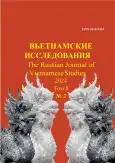Features of the Development of Vietnamese Choreographic Art
- 作者: Vasilenko V.V.1,2, Cao Thi V.D.3,4
-
隶属关系:
- North-Caucasus University
- Russian Presidential Academy of National Economy and Public Administration
- Vaganova Ballet Academy
- Vietnam Dance Academy
- 期: 卷 8, 编号 2 (2024)
- 页面: 79-94
- 栏目: Scientific researches
- URL: https://journal-vniispk.ru/2618-9453/article/view/263078
- DOI: https://doi.org/10.54631/VS.2024.82-607329
- ID: 263078
如何引用文章
全文:
详细
For the first time, based on a multidimensional model of Vietnamese culture, the article examines the features of the development of Vietnamese dance art, the process of its professionalization, and the introduction of European classical dance to Vietnamese soil. A layer of authentic Vietnamese culture is taken as a framework, around which the configuration of cultural elements and the style of art are crystallized in different historical and cultural contexts. The classification of types and types of Vietnamese choreographic art is given. The emergence of the national ballet as a new type of performing art for Vietnam is analyzed from the point of view of the contact of authentic Vietnamese culture with Chinese-Confucian and Buddhist, European, Soviet, modern Western cultural traditions. The most significant works of small and large choreographic forms of 1950-2024 are given. The scientific significance of the conclusions lies in the fact that the methodological approach developed by the authors, the factual material introduced into scientific circulation and the formulated conclusions help to clarify the modern picture of the dynamics of Vietnamese culture and art. The article shows the role and importance of modern choreographic art in establishing interstate cooperation. The conclusion is made about the progressive development of Vietnamese choreographic art, and the need to preserve traditional Vietnamese culture is emphasized.
作者简介
Victoria Vasilenko
North-Caucasus University; Russian Presidential Academy of National Economy and Public Administration
编辑信件的主要联系方式.
Email: vasilvika@yandex.ru
ORCID iD: 0009-0007-8931-3650
D. Sc. (History), Professor, High School of Creative Industries
俄罗斯联邦, StavropolVan Cao Thi
Vaganova Ballet Academy; Vietnam Dance Academy
Email: vandiemcao271991@gmail.com
ORCID iD: 0000-0001-8643-2151
Postgraduate Student; Lecturer
俄罗斯联邦, Санкт-Петербург; Ханой, Вьетнам参考
- Deopik, D.V. (1994) Istoriya Vietnama. Ch. 1. [History of Vietnam. Part 1]. M.: Izd-vo MGU. 320 р. (In Russian)
- Fairy tales and legends of Vietnam (2021). Comp. by Yu. D. Minina; trans. By Yu.D. Minina, E.V. Lyutik, A.M. Kharitonova; Higher School of Economics Univ., Moscow: Publishing House of the Higher School of Economics. 295 p. (In Russian)
- Huntington, S., Ajami, F., Mahbubani, K., Bartley, R.L., Binyan, Liu (2004) The clash of civilizations. Perspectives of world politics (S. Huntington's concept and its criticism). Journal of Afro-Asian world: problems of civilizational analysis, 47–66. URL: https:// cyberleninka.ru/article/n/stolknovenie-tsiv (In Russian)
- Khắc họa hình tượng về tranh Đông Hồ bằng ngôn ngữ ballet [Portraying images of Dong Ho paintings in ballet language]. Báo Dân tộc và Phát triển, 09.03.2023. (In Vietnamese)
- Kreber, A. (2001) Style and Civilization. Bulletin of Cultural Studies, 1(16): 7–23. (In Russian)
- Lâm Tô Lộc (1994). Múa dân gian các dân tộc Việt Nam [Lam To Loc. Folk dance of the peoples of Vietnam]. Hà Nội: Nxb. Văn hóa Dân tộc. 169 p. (In Vietnamese)
- Lê Ngọc Canh (1998). Múa tín ngưỡng dân gian Việt Nam [Le Ngoc Canh. Vietnamese folk religious dance]. Hà Nội: Nxb. Khoa học Xã hôi. 286 tr.
- Lê Ngọc Canh (2001). 100 điệu múa truyền thống Việt Nam [Le Ngoc Canh. 100 traditional Vietnamese dances]. Hà Nội: Nxb. Văn hóa Thông tin. 231 tr. (In Vietnamese)
- Lê Ngọc Canh (2008). Lịch sử nghệ thuật múa Việt Nam [Le Ngoc Canh. History of Vietnamese dance art]. Hà Nội: Nxb. Sân khấu. 695 tr. (In Vietnamese)
- Lê Ngọc Canh (2013). Nghệ thuật múa truyền thống Khmer Nam bộ [Le Ngoc Canh. Traditional Khmer southern dance art]. Hà Nội: Nxb. Văn hóa Dân tộc. 334 tr. (In Vietnamese)
- Lê Ngọc Canh, Tô Đông Hải (1995). Nghệ thuật biểu diễn truyền thống Chăm [Le Ngoc Canh, To Dong Hai. Traditional Performing Arts Cham]. Hà Nội: Nxb. Văn hóa Dân tộc. (In Vietnamese)
- Novakova, O.V. (2017) The revival of national traditions of Vietnam in the period of renewal. The Russian Journal of Vietnamese studies, 1(7): 275–293. (In Russian)
- Phạm Anh Phương (2009). Múa dân gian người Việt vùng Châu thổ sông Hồng, truyền thống và hiện đại. Luận án tiến sĩ [Pham Anh Phuong. Vietnamese folk dance in the Red River Delta, traditional and modern. PhD thesis]. Hà Nội: Viện Nghiên cứu Văn hóa. 202 p. (In Vietnamese)
- Samoylenko, E.V. (2012) The phenomenon of dance culture, features of genesis, functioning and transformation (based on the material of Russian culture of the XX-XXI centuries). Yekaterinburg. 112 p. (In Russian)
- Sokolov, A.A. (2017) Vietnamese culture: modern context. Proceedings of the Institute of Oriental Studies of the Russian Academy of Sciences, 3: 133–161. (In Russian)
- Streltsov, V.V. (2014) Development of cooperation in the field of cultural tourism in the context of strategic partnership between Vietnam and Russia. Journal of Culture and education: scientific and educational journal of universities of culture and art, 17–24. URL: https:// cyberleninka.ru/article/n/razvitie-sotrudni (In Russian)
- Sysolyatin, A.A., Slepchenko, V. (2023) The Memory of the War in American Culture in the 1970s: strategies for representing the figure of a veteran. Journal of Tempus et Memoria, 4 (2): 57–68. (In Russian)
- Yang Chen Yu (2023). The influence of Russian classical ballet on the formation of the Chinese school of dance. Journal of Culture and Civilization, 13 (8A): 208–213 (In Russian)
补充文件







